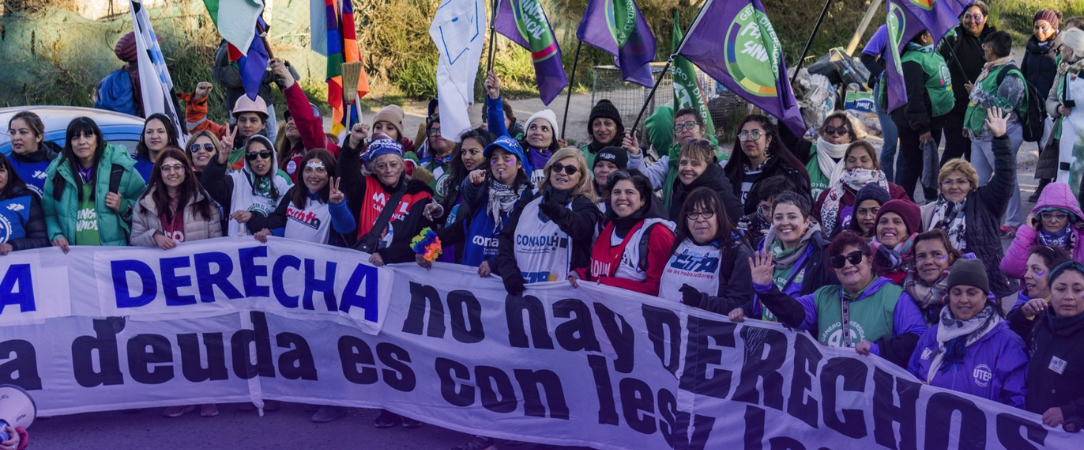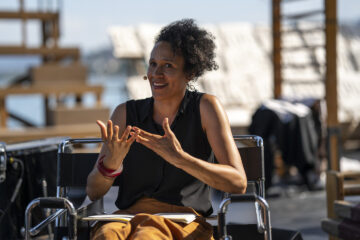Latin America and the Caribbean are territories where a material and symbolic battle is waged. The empire’s advances in recent decades in terms of power and greed are impressive, and they have been happening fast and relentlessly. It’s an expansion of unprecedented violence and spoliation. This is reflected on the institutional, economic, and productive levels, through neoliberal policies implemented by corporate representatives of concentrated power, that put strategies into practice to destroy our peoples’ living conditions.
This reality implies, to us, building the conditions for grassroots organizing to battle for all the spaces where the struggle is waged to overcome inequalities and asymmetries in our societies. We must wage an emancipatory battle that allows us to define a different way for the reproduction of our shared lives. In this sense, the contributions of feminism—and particularly of the World March of Women—and all the discussions around the Continental Day for Democracy and against Neoliberalism have been very important for our organization.
The experience of formation of our countries has shown that the administration of states is not enough, because their colonial and neoliberal origins have deeply creeped into their structures and have limited the development and transformation that our societies need. In this sense, it is fundamental for the working class to reclaim the struggle for power and the political representation of the peoples. This has to unite us, not necessarily as a political party, but as an emancipatory political project.
Latin American feminisms have a virtue: they have created a political identity that is capable of radically challenging, in the regional scenario, the systems of knowledge and organization of society. Especially since the 1990s, the discussions about building citizenship and the need to further develop democracy in the countries of our region became part of the agenda, and the relationship between movements and states, as well as the development of strategies to influence these democratic processes, became central to this conversation. The grassroots feminism developed on our continent has provided fundamental contributions to expose these tensions.
Today, a central question emerged regarding the agenda: where should the efforts to institutionalize the rights policy be placed in contexts where exclusion and social inequalities become deeper and deeper? The achievements we have had in recent years are important, but they seem small in face of the challenges to incorporate equality and rights into the democratic debate. The focus of building democracy must be on creating a life that is worth living. The struggle for women’s rights requires the development of an strategic vision for the future, where feminist agendas are not only supported by defending a discourse and reclaiming a space of our own, but by bringing together the democratic demands of society. Spaces of contestation and alternatives must be ensured in terms of thought, but also—like Nalu Faria used to say—in terms of action.
May we be capable of formulating not only what is possible, but also what is desirable.
Alejandra Angriman
In the Trade Union Confederation of the Americas (TUCA-CSA) and in my own organization, the Argentine Workers’ Central Union—Autonomous (CTA-Autonomous), we have an agenda that is strongly connected to the struggle of the grassroots feminist movement. We reflect on the debates that are being built on our continent. We don’t just talk about grassroots feminism—we also talk about the contribution of decolonial feminisms to our continent, which allow us to approach different aspects of integration from a different perspective.
Decolonial thought deepens our feminism, our perspectives on the North-South conflict, the global dimension and local bonds, to denounce the coloniality that persists in our territories and bodies. It allows us to analyze issues from perspectives ranging from geopolitics to economic and cultural dependency to social injustice across the region. It also allows us to look for answers through resistance, which is connected to the attempt to decolonize knowledge and power. This decolonial feminism that has emerged in the 1980s as a critical review of hegemonic feminisms must be restored.
Hegemonic feminism remains in our region and establishes a unique and universal view based on the concerns of white, Western, European, or US women. It’s important to go back to talk about Black feminisms, which were the first to take a stand regarding these Western feminisms. We must go back to the tradition of Latin American critical thought, including the critique of the international co-opting of feminism. Part of the feminism that emerged in the 1990s was co-opted by international non-governmental organizations and financial organizations that try to include us in an agenda connected to the defense of individual rights, denying collective rights or putting them on the back burner.
We need to once again value situated and horizontal knowledge, with no claims about universalim or unquestionable truths, to get more correct answers, more aligned with our region’s problems. Our grassroots feminism, with its different currents, has had the ability to reconsider the concept of power and the struggles for power, underscoring the different forms of oppression. By promoting horizontality in relationships, we must continue to contribute to the critique of the international order, to tear apart the relationships that are structured around masculinity.
This way, we can continue to reflect and ask new questions: what are the social roles built and assigned to men and women in regional integration processes? What other inequalities are interconnected to gender inequalities? How do these relationships become crystalized when building institutionality? How do integration processes impact our affections, emotions, and bodies? Where and how are women’s and diversity spaces included in these processes? All of these questions also have to do with contributions we have already made, and with those we must continue to make to build an agenda that considers women’s issues.
The challenges are not just about exposing these multiple inequalities, subalternities, and hierarchies that permeate all these subjects that are in these political spaces. Analyzing regional integration from a decolonial and grassroots feminist perspective does not mean fixating on a perspective about lived experiences, but rather devote a necessary effort to formulate new questions that challenge these integration processes. We have done a lot, but we still have a lot to do. What has been on the back burner? We must bring together all the knowledge we have built, as well as the social struggles that remain segmented by the patriarchal logic. From feminism, we can create communicating vessels to analyze and think about regional strategies that can be challenging and combined with the current social mobilization. Feminism builds bridges and bridges gaps.
____
Alejandra Angriman is a World March of Women militant in Argentina and a member of the Argentine Workers’ Central Union—Autonomous (CTA-Autonomous). She is currently the chair of the Women’s Committee of the Trade Union Confederation of the Americas (TUCA-CSA). This is an edited version of her speech at the webinar “Feminism and regional integration” held by the WMW Americas on November 30th, 2023.
Original language: Spanish




